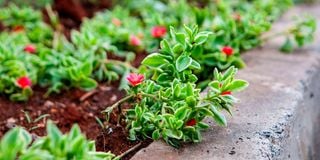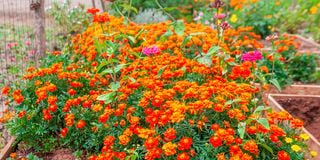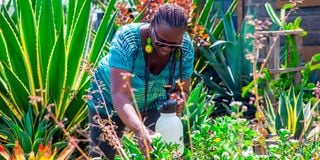When Alice Migwi and her husband bought their one-acre land in Isinya, Kajiado County it was all dry and sulky. It was hard to imagine that 12 years later, it would be this tranquil, with lots of greenery, butterflies and birds, ornamental plants, and Pemba and Kikuyu grass creating a beautiful lawn.
Their labour of love has paid off, she says.
At her home, she has created a beautiful xeriscape, a practice of designing landscapes to reduce or eliminate the need for irrigation or constant watering.
She has grown over 25 species of succulent plants. The garden has more than five species of agaves, which have rosettes of succulent leaves used to make tequila. Her garden also has false pineapples, aloe vera, ponytail palms and jade plants.
Alice Migwi tends to her garden in Isinya Kajiado County on May 28, 2024.
Photo credit: Billy Ogada | Nation Media Group
Her balcony has potted plants and she has used traditional kettles and cups, giving the space a touch of Africa.
On one side of the garden, there is a colourful array of flowering plants including marigolds and African daisies. She refers to this area as the “pollinator hotspot.”
“My home now attracts a lot of bees and butterflies. I love to see how nature interacts with each other. I also have birds, lizards, frogs, geckos, and even hedgehogs,” says the 48-year-old, adding, “I get to interact with nature despite living in a dry area”.
For many people, the late 40s signals a more relaxed living, perhaps away from the city, but they cannot live far because of the long commute time to work or school. However, Ms Migwi says living in Isinya has worked perfectly for her family and the greenery is now a bonus.
“We have lived in several places, including Uganda, Tanzania and different locations in Nairobi. Now I’m working as a consultant/entrepreneur, so Isinya is a perfect place. As much as it seems rural, it just felt right. Our children are also big enough to cope with living here and we have only one daughter in school whom we drop and pick and it works out quite fine. I also have another brother who lives not too far away and that gives us comfort in its own way,” she says.
Ms Migwi’s love for gardening started when she was young.
“Since I was a child, I have always been fascinated by flowers, especially roses and the mimosa. The little things fascinated me so much and so I always had a love and interest for plants. The more I ventured into it, the more I just fell in love with it,” she recalls.
Her first garden gave her a space to experiment with vegetables and beautiful flowers such as monsteras – the evergreen perennial vines and other flowers that are essential for any plant lover with high expectations of creating beautiful botanical worlds.
“The climate of this area said a lot about how the art would be done. It is so dry and hot. I had the idea of planting beautiful flowers, but the plants died a painful death even when I watered them. They reminded me of the climatic conditions I live in,” Ms Migwi recalls.
She did not give up. She went back to the drawing board.
“Plants will let you down, they will die, and that’s probably every gardener’s first experience. We always have that period where you start and then you say no, this is not for me,” says the mother of three.

Baby sun rose ground cover plants at Alice Migwi’s garden in Isinya Kajiado County on May 28, 2024.
Photo credit: Billy Ogada | Nation Media Group
She has had many such episodes but always comes back stronger.
“Just two years into desert landscaping, my love of working with plants and creating garden spaces has grown far beyond the reach of secateurs or loppers,” says Ms Migwi, adding, ” I’m a creative person at heart. I thought about how I could paint the landscape into a picture that represents who I am, a place that would make me and others feel at home. While most people choose to grow food, I wanted to do something different.”
The art extends into her house. The corridors are lined with potted money plants [Epipremnum aureum, grown to fill the house with prosperity and wealth]. She also has a Hoya, a reliable warm-weather bloomer which thrives in the right soil, plenty of light, and adequate water. She also has multicoloured Aglaonema, which she bought from local vendors.
“Many residents here don’t know about ornamental plants, but they [plants] grow best here. So I thought, if I can show people, they can go and practice it in their homesteads so they can have beauty around them,” she says.
For those looking to pot their flowers, she says “potted plants can become stressed because they are confined to a small space.”
“Plants communicate and thrive when they grow together, sharing nutrients and water. When a plant is alone in a pot, it can become weak and dry up quickly. They may appear unhappy because they are solitary and require more attention,” she says.
Her secret to maintaining a lush garden is to stick to the basics. When planting, she uses compost alone or mixed with soil. Occasionally she feeds the plants to ensure they have nice, healthy-looking leaves, and finally, she adds natural fertiliser. She uses a mixture of black cotton soil and sand.
“The black cotton soil holds a lot of water. The sand is added to drain the excess water because plants don’t thrive in waterlogged conditions. Plants store water in their leaves, taking only what they need and releasing any excess. If you grow them directly in the black cotton soil, they will rot,” she says.

French Marigold at Alice Migwi’s garden in Isinya Kajiado County on May 28, 2024.
Photo credit: Billy Ogada | Nation Media Group
“When trying to improve your space, it’s important to consider your climate. Don’t try to grow something just because you’ve seen it elsewhere and assume it will work for you. When it comes to ornamental plants, soil quality is not a concern. If the climate is suitable, the soil will be too,” she adds.
“As drought-tolerant plants, “I don’t water them at all. Instead, they draw water from the humidity,” she says.
Ms Migwi does not see it as a challenge to look after her plants. “I only do weed.” “If you are a busy person and you want to garden, you can start with ornamental plants. They are easy to maintain, they don’t bother you with diseases, you don’t have to worry when you travel,” she notes.
But for her lawn, what was supposed to be her living space became her drying space. She had to spread 20 tonnes of fertiliser to get her Kikuyu and Pemba grass to stick.
“The rainy season was a blessing for my grass, it gave me the boost I needed,” she says.
Beyond her own garden, Alice extends her passion to the community. As a consultant, she designs outdoor spaces for local families, often creating areas for play and relaxation surrounded by wildlife-friendly and fragrant planting. She is also an author, sharing her knowledge and love for gardening with others.
Alice’s vision as a gardener is to create a community space with native plants where people can interact with nature.
“I enjoy all aspects of gardening, from planting seeds to pruning hedges and clearing branches. Gardening is the best form of exercise, and I’m always surprised by how good my body feels after just a few minutes in the garden,” she says.
Alice Migwi has found joy and peace in xeriscaping, proving that with passion and perseverance, even the driest lands can bloom beautifully.
“The glory of gardening is to have your hands in the dirt, your head in the sun, and your heart in nature,” she reflects on the words of Alfred Austin (English poet).













